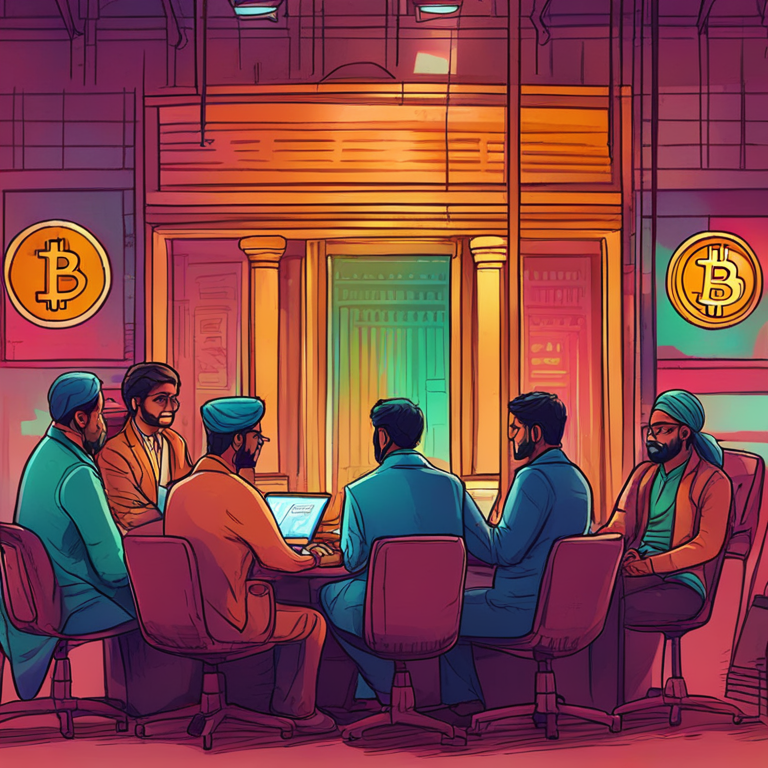India's Market Regulator Suggests Shared Crypto Oversight Even as RBI Seeks Stablecoin Ban: Reuters
- byAdmin
- 16 May, 2024
- 20 Mins

Introduction
Indian authorities are once again stirring the crypto cauldron, whipping up a blend of regulation and resistance that would make even the boldest crypto enthusiast’s head spin. In the latest twist, India's market watchdog, the Securities and Exchange Board of India (SEBI), has proposed a multi-regulator approach to keep an eye on the burgeoning crypto market. Yet, this collaborative kumbaya doesn't sit well with the Reserve Bank of India (RBI), which is adamant about giving stablecoins the boot. Buckle up, folks; this is about to get interesting.
Background
In India, the crypto scene has always had a flair for the dramatic, with governmental bodies taking center stage like rock stars at a sold-out concert. While the RBI has consistently pitched cryptocurrencies as the ultimate threat to policy sovereignty, SEBI seems more inclined to take them out for chai and a chat. Recently, SEBI submitted a recommendation to a government panel outlining a shared oversight framework for crypto assets. This isn’t just a polite suggestion, mind you. It’s more like saying, "Hey, why don't we all share the load and see what happens?"
SEBI's Suggestion

SEBI’s proposal is essentially a call for teamwork. The idea is to divide and conquer the crypto universe by assigning various types of virtual assets to different regulatory bodies. SEBI would take charge of crypto-securities and ICOs (Initial Coin Offerings)—you know, the new kids in the financial block. The RBI, always wary of digital shenanigans, would handle stablecoins and other assets backed by fiat currencies. And don't forget the Insurance Regulatory and Development Authority of India (IRDAI) and the Pension Fund Regulatory and Development Authority (PFRDA); they’d be dealing with insurance and pension-related virtual assets, respectively. Frankly, it's like assigning superheroes to tackle different villains in a comic book—a little idealistic but brimming with potential.
RBI's Position
On the flip side, we have the ever-watchful RBI, which isn’t about to let stablecoins waltz into the financial system unchecked. The central bank has made it abundantly clear that it views cryptocurrencies, especially stablecoins, as existential threats. Think of the RBI as the overly cautious guardian who believes your new friend (crypto) is bad news. Their stance remains firm: a flat-out ban on stablecoins. According to inside sources, the debate has been as charged as a Bitcoin mining rig. The RBI's rationale? They argue that centralized control over a decentralized asset contradicts the essence of policy sovereignty.
India's Crypto Policy
As the curtain rises on India’s evolving crypto policy, it’s clear that clarity is still a far-off dream. The Finance Ministry has been threading a fine line, neither outright legalizing nor criminalizing cryptocurrencies. Instead, they have smothered the sector with heavyweight taxes—a move that’s as clear as mud. To add to the drama, national elections are around the corner, with results due by June 4th, making it unlikely any groundbreaking crypto bill will pop up before mid-2025. Interestingly, there have been glimmers of change. The Finance Ministry, as the G20 president, has been rallying for a global consensus on crypto. Moreover, over 46 crypto-related companies have been greenlit by India’s financial intelligence unit, hinting at a slow yet noticeable shift toward accepting digital assets. Yet, for now, the regulatory stage is buzzing with anticipation, discussions, and a whole lot of uncertainty.

Details
In the latest development from India regarding cryptocurrency regulation, the Securities and Exchange Board of India (SEBI) has stirred the proverbial pot by suggesting a multi-regulator approach to oversee the booming digital asset space. This comes amidst the Reserve Bank of India (RBI) throwing its weight around, pushing for a ban on stablecoins like a heavyweight champ. According to Reuters, this intriguing suggestion by SEBI was presented to a government panel busy scribbling down policies for the Finance Ministry. The RBI, on the other hand, probably isn't thrilled about sharing the sandbox with others given its stance on digital currencies.
SEBI's Proposed Oversight
SEBI’s grand plan involves distributing the responsibilities of crypto governance amongst several regulators, like a well-coordinated dance routine, except with a lot more paperwork. Under this visionary scheme, SEBI could take charge of cryptocurrencies that resemble securities and initial coin offerings (ICOs). Meanwhile, the RBI would be the guardian of the gate for stablecoins backed by fiat currencies. The Insurance Regulatory and Development Authority of India (IRDAI) would oversee insurance and pension-related virtual assets, in harmony with the Pension Fund Regulatory and Development Authority (PFRDA). And just like Oprah giving out cars, the Consumer Protection Act would swoop in to handle investor grievances. It’s like SEBI is sayin': "There's a job for everyone!"
RBI’s Proposed Ban
Over in the other corner of the ring, the RBI isn’t pulling any punches when it comes to its belief that cryptocurrencies pose a grave threat to policy sovereignty. By pushing for a ban on stablecoins, RBI is trying to keep the financial ship steady. According to inside sources cited by Reuters, the RBI is concerned that allowing stablecoins would be like letting the fox into the henhouse. The RBI seems to be the strict parent in this crypto saga, wanting to ground stablecoins indefinitely to maintain the stability of the economy. To be fair, navigating the crypto labyrinth is no easy task, and RBI’s cautious approach is perhaps driven by its aim to avoid a financial ruckus.
Current Status

Government Panel Report
The government panel, entrusted with forming crypto policies, is expected to submit its report by June. This report might be the magical scroll that determines the future of crypto regulations in India. With SEBI and RBI presenting contrasting viewpoints like debaters on steroids, the panel's job is nothing short of a Herculean task. All eyes are on this panel as their report could carve the path for future cryptocurrency governance. It's like waiting for the next episode of a gripping series, but with a lot more at stake!
Election Impact
Now, let’s throw in a curveball – India is in the thick of national elections with the results looming in early June. The crypto industry is holding its breath as the political landscape could drastically impact policy decisions. Jayant Sinha, chair of the parliament's Standing Committee on Finance, hinted back in December that the country might not see a specific crypto or Web3 bill until 2025. So, much like a suspense thriller, the plot of crypto legislation could take several unexpected twists before reaching a conclusion.
Future Legislative Actions
While the Finance Ministry has, so far, danced around giving a definitive statement on the legality of crypto, it has indulged in taxing the industry quite rigorously. Despite these complexities, whispers of changing credibility for crypto are making waves. For instance, under India’s presidency, the G20 made strides towards forming a global consensus on crypto regulations, with the Finance Ministry leading the charge. Recent signs point towards the Indian government reassessing its stance on crypto over the next few months. Last week, a ministry official spilled the beans, stating that registering over 46 crypto-related firms with the nation’s financial intelligence unit marks a credibility shift for the industry. Although legitimacy still hangs in the balance, policy-makers might soon tip the scales.

Industry reactions
Oh, the drama in the Indian regulatory landscape! It seems like crypto regulators in India are more divided than a family at Thanksgiving. On one side, we have the Securities and Exchange Board of India (SEBI) suggesting a buffet-style oversight approach—y'know, a little bit of everyone gets to regulate something. Their proposal to split managing cryptocurrencies among multiple authorities has everyone talking, and not just around the water cooler. Apparently, this suggestion has been tossed like a hot potato to a government panel responsible for advising the Finance Ministry. With India's financial heavyweights making moves and grooving, the reactions from industry insiders have been both colorful and varied. Some are cheering for what could be a more inclusive and fair oversight system, while others are raising eyebrows at the potential bureaucratic nightmare this could create. SEBI’s stance contrasts sharply with the Reserve Bank of India (RBI), which has been waving its "ban stablecoins" sign more vigorously than a football fan at a match.

Crypto firm registrations
It's raining registrations in the realm of crypto firms in India! According to the latest gossip, more than 46 crypto-related firms are now officially registered with the nation's financial intelligence unit. It's almost as if crypto firms found the secret door into India's mainstream financial world. This step is being seen as a sign of growing credibility for cryptocurrencies within the country. Maybe it’s like getting that blue tick on Twitter—a nod that says, "Yep, they’re legit!” However, the road to legitimacy hasn’t been paved with rose petals. Skepticism still looms around, as regulatory clarity is foggier than a spooky Halloween night. SEBI, the RBI, and the rest of the regulatory alphabet soup have yet to give solid comments. But hey, industry players are cautiously optimistic; after all, being on the official radar is a step closer to validation, however nerve-wracking that might be.
Signals of credibility change
There’s a whiff of change in the Indian crypto air, like catching the first scent of fresh popcorn at the movies. The Finance Ministry, usually the silent type when it comes to crypto’s legality, has been sending out mixed signals that have everyone on their toes. Last year, they spearheaded an effort for global consensus on crypto as G20’s head honcho—talk about making a grand entrance! Fast forward a bit, and it looks like they’re still figuring out if they want to swipe left or right on crypto. Adding to the credibility buzz, SEBI has put its hand up to manage crypto assets that resemble securities and ICOs, while the RBI might regulate stablecoins (if they don’t ban them first). Meanwhile, India’s consumer protection laws could become the customer service hotline for a disgruntled crypto community. Overall, these moves suggest a more nuanced approach could be brewing, even if it’s not arriving faster than a pizza delivery.
Conclusion
Ethan Taylor
Ethan Taylor here, your trusted Financial Analyst at NexTokenNews. With over a decade of experience in the financial markets and a keen focus on cryptocurrency, I'm here to bring clarity to the complex dynamics of crypto investments.



